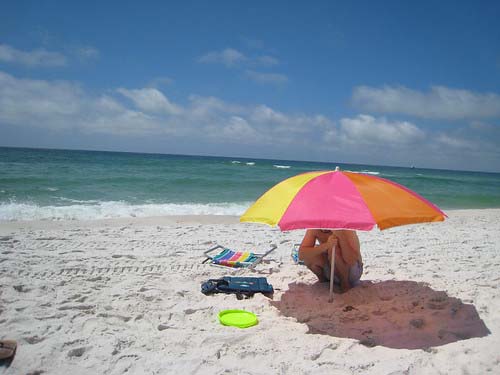We Need to Think about Social Anxiety and Coronavirus

As a society, and as individuals, we’re going to have to deal with the realities of social anxiety and coronavirus.
As the picture above of our individual enjoying his socially distanced day at the beach might suggest, it’s likely that we’re going to be dealing with the effects and after-effects of the COVID-19 “shelter-in-place” policies for some time. How is that going to impact us?
One the things that is having the most dramatic impact is the increase in levels of social anxiety. It may be that some people are bursting at the seams, almost, to rush back into social interaction. However, as /a-midlife-transitions know very well from experience with clients, there are as many, and quite probably more, individuals who face the prospect of increased social interaction with genuine anxiety and dread.
Coronavirus Heightens Social Anxiety
For two and a half months now, we have lived with the realities of “social distancing” and “shelter in place”. Most of us “know the drill.” We avoid others on the sidewalk, wear face masks; wash hands frequently; submit to controlled passage through grocery stores; and disinfect after handing anything from outside the home. In short, we’ve adapted to a new environment. As we’ve done this, what was once a benign, friendly and inviting world has become, not exactly menacing, but uncertain, and many people find that difficult.
It’s clear that, for some people, going out into the coronavirus world is proving challenging. A surprising number of people have kept almost entirely confined to their homes. It’s not uncommon for clients to tell their analysts or therapists that they haven’t been outside of their homes more than a handful of times since “shelter in place” began. Some people add that they don’t even go to the grocery store, choosing to have all their groceries delivered and/or to have many of their meals delivered.
It’s particularly concerning when you ask individuals who are facing these issues about the future. As one person put it, “I can’t imagine going outside again, when this is all over. Even if there’s a vaccine, I’m going to have trouble getting out there.” There are strong grounds for concern that the impact of the lockdown on our psyche is going to be substantial. As has been said, perhaps the recession we should be most concerned about is not the economic one, but rather the social recession — people retreating into their private spheres, and finding it difficult to emerge.
Our Social Instinct
To be ourselves, to be fundamentally human, is to be social. Although the social instinct is expressed in a different way, this is just as true for introverted folks as it is for extroverts. We may not crave the concert of a pop superstar, or feel a great sense of solidarity with the fans at Toronto Maple Leafs hockey game, but even the most inward of us relies on social connection with others to obtain food, shelter, clothing and transportation, to make a living, and to feel appreciated and validated, through interaction with others.
Since our days in Africa’s Olduvai Gorge, and even before, we and our ancestors like the famous “Lucy” have been fundamentally social creatures, who exist in relationship to others. If we’re impaired in our social functioning, we lose part or all of our ability to live a full human life, and, in Jungian terms, to individuate (or, “journey towards wholeness”).
Surveys on mental health and COVID-19, such as that done by the Australian National University have shown that the social disruption caused by the lockdown is substantial. The data would suggest that people are feeling anxious about the prospects of social re-connection. Also, people who fear germs, such as people with obsessive compulsive issues, are concerned about going back into public spaces. It’s also quite possible that people who haven’t really experienced anxiety or depression could actually have a more difficult time than those who have, because they haven’t had to deal with this type of thing before.
It may well be important for people who haven’t had to deal with much anxiety or depression to monitor their own reactions as they go through the remainder of this lockdown process. If people are experiencing symptoms of anxiety or depression as this process goes on, it could be very important to reach out for help. Fortunately, in the age of online therapy, this can be easily done, even in the midst of lockdown conditions.
Through Social Anxiety Toward Meaning
It’s important for all of us to seek to stay socially connected, and to firmly but gently challenge ourselves to explore our anxieties and fears, as we get back into social interaction. It’s important for us to be kind and self-compassionate, if we notice any linkage in ourselves between social anxiety and coronavirus, but also to not be passive or complacent. Quality /a-midlife-transition, such as Jungian therapy, may well be of great assistance in this process, which for all of us is a major life transition.
With best wishes on your journey to wholeness,
